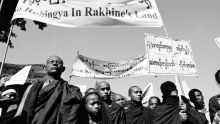'Genocide' in Myanmar
Updated
The systematic violation of human rights against Rohingya Muslims in Myanmar, formerly known as Burma, falls within the framework of genocide, according to a new report by the International State Crime Initiative.
Thomas MacManus, who co-authored the Countdown to Genocide report, details the findings.
| quotable-full |
|---|

|
| Our report reveals that there is a genocidal process going on. We used the framework [based on genocides of the past] which has a periodisation ... and we matched those with the situation on the ground in Rakhine State. |
| quotable-full |
|---|

|
| The first stage is stigmatisation. That is when you find a group and you identify them as outsiders and you start to dehumanise that group. [There are 1.2 million Rohingya Muslims in Rakhine State and now] you are not even allowed to use the word Rohingya inside Burma. We couldn't use it on the street in case someone overheard us. The government refers to them as illegal Bengalis. This is a way of labelling them as outsiders making it easier for people to treat them outside their sphere of obligation. |
| quotable-full |
|---|

|
| The next stage is harassment and terror. This is when the verbal violence turns to physical violence. In June 2012, we had what the government called communal violence, but we found in our report that this was not spontaneous, it was highly organised. Villages received letters days before the violence was to start informing them that they needed to have people ready for buses to pick them up. Large numbers of people were brought down to Sittwe [northern Rakhine State], and two Rohingya villages were burnt to the ground and people were filtered into a large camp complex. One hundred and forty thousand Rohingya have been living in that camp complex for the last three years. |
| quotable-full |
|---|

|
| The next stage is isolation and that is where the camp complex comes in. You're not allowed to leave, they are detention camps in effect. Outside of Sittwe, we heard reports that Rohingya don't have freedom of movement, and that they are isolated. |
| quotable-full |
|---|

|
| The next stage is systematic weakening. Once the group is isolated, you remove healthcare. Medecins Sans Frontiers have been unceremoniously kicked out of Rakhine State. Rohingya are not allowed to be educated, it is very difficult to get to hospitals, they are not allowed to politically organise, they have been disenfranchised, and they cannot vote in the upcoming elections. And this creates a sick community, they are not allowed to progress, they don't see a future for themselves. That's where we are now, in the systematic weakening phase, and the next stage is annihilation, and that's why we have grave concerns. |
| quotable-full |
|---|

|
| In Burma, you see Nazi paraphernalia on the streets. You see people with T-shirts that might have Hitler on them or SS helmets that are for motorcycle helmets. Whether people are aware of the connotations or not is another question, that we weren't able to answer. We did find that the local National Party, who are the nationalist party in Rakhine State, used phrases like "defend the fatherland", they talk about while Hitler may have been enemies of the Jews, they were most likely heroes to the German people. They talk about defence of the blood lines and things like that, which could be inferred to become from Nazi ideology. |
| quotable-full |
|---|

|
| The Rohingya, who make up 40 per cent of Rakhine State, can't vote. Aung San Suu Kyi's party is expected to do very well [in the upcoming elections]. Her silence on the issue so far has gone from disappointment to a real suspicion of complicity in the treatment of the Rohingya. One would expect a moral leader of Aung San Suu Kyi's stature to have spoken out about this issue a long time ago and there are serious questions now as to why she hasn't. |
 Video: Researcher Thomas MacManus from Queen Mary University of London discusses the report's findings with The World.
(The World)
Video: Researcher Thomas MacManus from Queen Mary University of London discusses the report's findings with The World.
(The World)
Photos: Queen Mary University of London ISCI
Topics: community-and-society, refugees, human, human-trafficking, law-crime-and-justice, elections, burma
First posted






